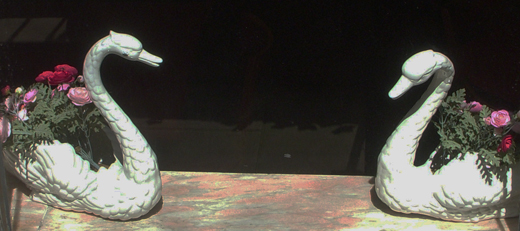Weekend Update (Sunday Edition): Spring Fever
The weather turned colder today, but I was too sick with spring fever not to spend the morning reading the Times and The Economist by an open window, drinking cup after cup of Kona. (The Kona was in honor of Kathleen’s birthday, which we’ve been celebrating for a while but which actually did fall today.) Presently my distress could not be overlooked. The week’s fatigue seemed to have given way to some kind of genuine illness. There was, for example, a frightening burp that very nearly exploded into something much worse. By six o’clock I back in bed, so cold that only a flannel nightshirt would do.
By eight, I was back up again, reading in my chair — the window firmly closed. I wanted very badly to read The Song Is You, Arthur Phillips’s deeply etched new novel, but I couldn’t; I’d have risked a new but, I think, very practical rule. It is a bad idea to finish a novel before I’ve written up the one that I read just before it. The one just before it was The Vagrants, by Yiyun Li. The trick to writing about The Vagrants is to convey something of the enormous excitement of the book’s many narrative strands, a task that most readers would dismiss as bound to fail if told too much about the novel’s period and setting. The trick to writing The Vagrants itself seems to have been to capture the interest that people take in their own lives. Not to describe the interest, but to represent it, with all the force of a Renaissance illusion. By comparison, even a writer as discreet as Jane Austen seems to fill every page of her novels trumpeting her own ideas about her characters’ choices. Ms Li would seem to have learned a great deal from cinematic storytelling, but with the difference that the existential quality of five or six is completely realized, from an interior beyond the camera’s reach.
Since I couldn’t read fiction, then, I turned to Postwar, Tony Judt’s magnum opus, which has been out for nearly four years. Better late than never? Clearly: the book is indispensable. I don’t know when I began reading it; I’d like to say, “last year,” but I’m not so sure. I’m quite near the end, gratified to read views about European affairs that I almost always share.
And I read a lot of magazines: Atlantic, Harper’s, L’Express. I can’t claim to have read the French periodical, but the photographs are always great, and it was nice to recognize Bernadette Chirac without having to read the legend. There was also an amusing photograph of the Mayor of Paris, Bernard Delanoë looking, frankly, rather fishy. Perhaps he looked fishy because I was sitting beneath an ornate tapestry of the city’s armorials. You’ll remember that these center on a small boat on the wavy seas. The words “non mergitur” were strikingly legible. What I gleaned from the story is that M Delanoë has been AWOL, sulking about his failure to wrest the PS from the Royals. Don’t take my word for it, though; I didn’t really read anything.
Wouldn’t it be droll if Mr Delanoë switched jobs with Michael Bloomberg? Bloomberg in Paris — it’s worthy of Offenbach at least. Imagine Sarko’s nail-biting despair — I hear a choir of double-basses, right out of Otello. And then there would be the out-of-town picnic (“O Beau Pays de Touraine”) in which Carla Bruni (accompanied by Winterhaltrian bevies) approaches the New Yorker with rapprochemdent in mind — only to find that she has never known what love is, until now! “(“Mon beau Bonaparte, fais de moi ta Beauharnais!”)
I’ve been tempted to write about Mayor Bloomberg’s machinations vis-Ã -vis the MTA rescue plan, currently blocked by six troglodytic Dems from the boroughs whose constituents will eventually have to be persuaded of the necessity of tolling intra-city bridges. But that would violate another new rule: no writing about stories that haven’t come to conclusion (“Bridges to be Tolled!”)
Which also means staring down the temptation to write about my health.

